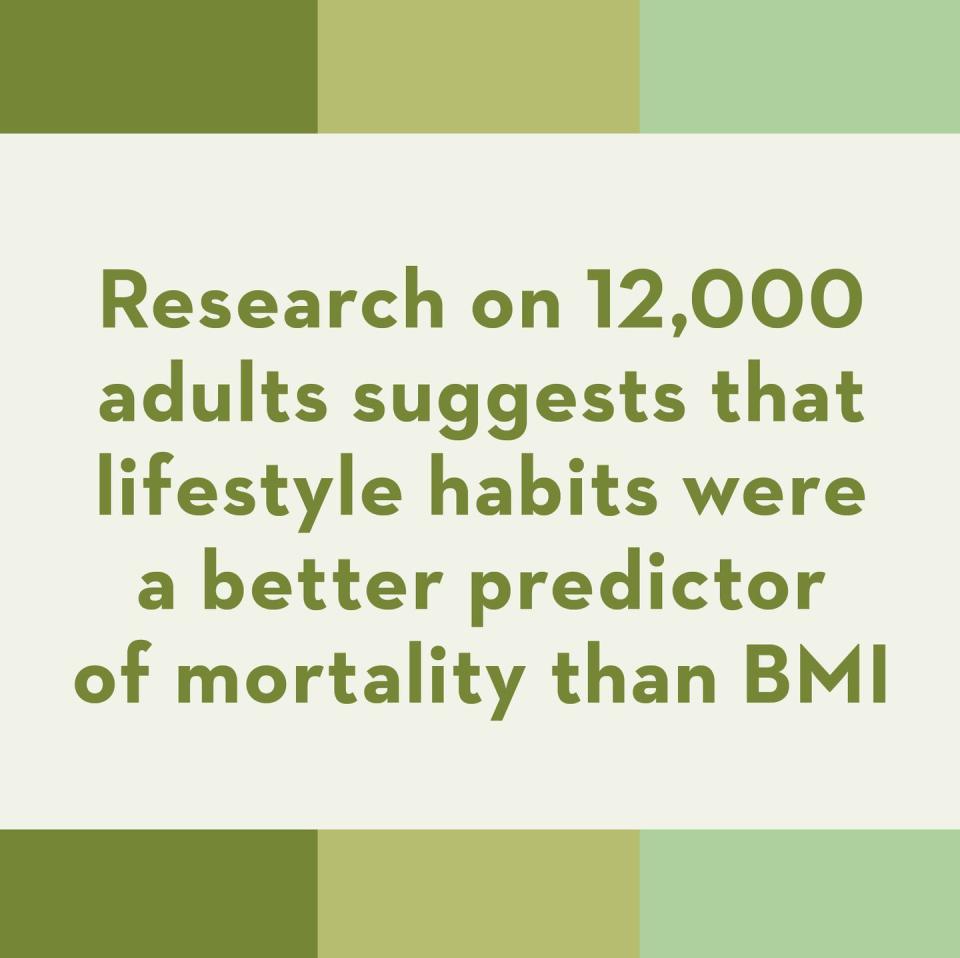Why Everything You've Been Told About Weight May Be Wrong


Whenever we go to the doctor’s office — whether it’s for an annual physical or a sore throat— one of the first things we do is step on a scale. For some of us, it’s a fraught moment: Will the number be higher or lower than last time? How will we feel about that? And folks in larger bodies, especially, may wonder: What will my doctor think about that?
In a paper published in 2014, researchers found that 21% of patients with BMIs in the “overweight” and “obese” ranges felt that their doctor “judged them about their weight” — and as a result, they were significantly less likely to trust their doctor or even to return for follow-up care. And research shows that this lack of trust is valid: Doctors are more likely to be biased against patients with high BMIs, and that this impacts the quality of the medical care they receive.
After analyzing audio recordings of 208 patient encounters by 39 primary care physicians, scientists found that doctors established less emotional rapport with their higher weight patients, according to a study published in a 2013 issue of the journal Obesity. Other studies have found that this lack of rapport makes doctors more likely to deem a higher-weight patient as “noncompliant” or “difficult,” often before the exam has even begun. And for women, gender non-conforming folks, people of color and people with low socioeconomic status, a doctor’s weight bias may intersect with other biases and potentially make the situation worse.
Medical weight stigma can have dire consequences. When patients delay healthcare because they’re worried about discrimination, they miss regular screening exams and are more likely to be much sicker by the time doctors do see them, which is one of the reasons why some people assume everyone in a larger body is unhealthy and observe correlations (but not causations) between higher body weight and chronic health conditions that benefit from good preventative healthcare.
At the same time, provider bias can lead doctors to under-treat or misdiagnose their larger patients in all sorts of ways. Patients in larger bodies with eating disorders tend to struggle longer and be sicker when they finally do get treatment, because doctors can ignore their symptoms — or even praise their disordered eating when it results in weight loss. Weight stigma also causes doctors to overlook problems that aren’t about weight. For example, in May 2018, a Canadian woman named Ellen Maud Bennett died only a few days after receiving a terminal cancer diagnosis; in her obituary, her family wrote that Bennett had sought medical care for her symptoms for years, but only ever received weight loss advice.
Because of this mounting evidence about the health consequences of medical anti-fat bias, some providers are starting to shift their medical practices to what’s known as the “Health at Every Size” approach, the purpose of which is to take the focus off a person’s weight, and instead look more holistically at their overall health. Of course, many doctors are still using scales and prescribing weight loss. But the Health at Every Size movement can be a model for health and wellness that you can adopt for yourself, too.

So, what is Health at Every Size?
Most doctors today approach health through what’s known as the “weight-centric” model, where weight is viewed as one of, if not the, most important marker of health. In the weight-centric model, if the patient is in a larger body, many conditions are treated primarily through the prescription of weight loss. Health at Every Size, commonly known as HAES (pronounced “hays”), is an alternative approach, also sometimes referred to as a “weight-inclusive” model of healthcare.
HAES originated in the fat acceptance movement and was further popularized by Lindo Bacon, Ph.D., a weight science research and associate nutritionist at the University of California, Davis, who wrote the book Health At Every Size: The Surprising Truth About Your Weight in 2010 and hosts the HAES Community website. “Health at Every Size is the new peace movement,” writes Bacon. “It is an inclusive movement, recognizing that our social characteristics such as our size, race, national origin, sexuality, gender, disability status and other attributes, are assets and acknowledges and challenges the structural and systemic forces that impinge on living well. It also supports people of all sizes in adopting healthy behaviors.” (If you're interested, more information about the history and philosophy of HAES is available from the Association for Size Diversity and Health.)
HAES-informed practitioners do not routinely weigh patients, or use weight to determine how healthy a person is. Instead, they look at other biomarkers, like blood pressure and cholesterol levels, to assess physiological health. And they consider how various social, economic and environmental factors in a person’s life impact their ability to pursue health. Translation: Instead of assuming you’re lazy or uninformed if you aren’t exercising or eating vegetables, a HAES-aligned doctor will ask about your schedule, responsibilities and priorities, to see what kind of barriers you face to adopting a regular workout routine. And they’ll take into consideration whether or not you live near a grocery store, have time to cook, or can otherwise easily access healthier food.
This doesn’t mean a HAES provider won’t ever encourage you to be more active or change your eating habits; it means they’ll only recommend changes that are attainable and realistic for you. And, most crucially, they won’t be telling you to do these things to lose weight. In the HAES model, weight loss is never a goal of treatment because your body is never viewed as a problem to be solved. You have the right to pursue health in the body you have, rather than waiting for that body to change in order to be deemed healthy.
But isn't it unhealthy to be fat?
Contrary to popular belief, it’s not inherently unhealthy to be fat. Research shows that the relationship between weight and health is much less clear-cut than we’re often told. Weight may be a correlating factor in health conditions like diabetes and heart disease, but scientists haven’t been able to prove that a high body weight causes such diseases. In some cases it may contribute, or it may be simply another symptom of a different root cause. (Consider how smoking can cause both lung cancer and yellow teeth — but nobody assumes that yellow teeth cause lung cancer.)
In fact, weighing more can actually protect you against certain health problems, including osteoporosis and some kinds of cancer. Heart surgery patients with higher BMIs also tend to have better survival rates than their thinner counterparts. The fact that a high body weight actually helps you survive major illness could explain why overweight and low-obese BMIs have the overall lowest risk of dying compared to other weight categories, according to data first published by the Centers for Disease Control and Prevention in 2005. In short, it is absolutely possible to be fat and fit.
Even if you live in a larger body and do have health conditions often assumed to be weight-linked, there is good evidence that you can treat those problems and improve your health without pursuing weight loss. In a 2012 analysis of almost 12,000 adults, researchers found that lifestyle habits were a better predictor of mortality than BMI because regardless of their weight class, people lived longer when they practiced healthy habits like not smoking, drinking alcohol in moderation, eating five or more servings of fruits and vegetables daily and exercising 12 or more times per month.
That’s good news because despite how often doctors prescribe it, we don’t have a safe and durable way for most people to lose significant amounts of weight. That’s because our bodies are programmed to fight weight loss, for our own good. According to an evidence review of common commercial weight loss protocols first published in 2007, and later updated in 2013: People lose some weight in the first nine to 12 months of any diet, but over the next two to five years, they gain back all but an average of 2.1 pounds. And dieting and “weight cycling” in this way can increase your risk for disordered eating and other health problems.

How do I practice HAES — and how do I get my doctor on board?
Practicing Health at Every Size will look different for everyone, because that’s part of its beauty: You get to decide your own health priorities and can focus on the goals that are accessible and realistic for your life, rather than following a doctor’s “one size fits all” approach to health. But there is one universal tenet: Your weight is no longer part of the conversation. That might mean that you ditch your scale, stop dieting and exercising for weight loss, start to explore intuitive eating and joyful movement — or all of the above.
But while there is growing awareness of HAES in the medical community, it is not the default approach in most healthcare offices. To find doctors or other practitioners in your area who identify as HAES-aligned, you can start by checking the HAES provider directory. But if not, it may be possible to have a productive conversation with your current doctor about why you’d like to take the focus off your weight. One simple way to set this boundary is to decline to be weighed at the start of the visit.
You may worry that the doctor’s office won’t allow you to skip the routine weigh-in, but you have a right to refuse to be weighed, says Dana Sturtevent, R.D., a dietitian and co-founder of Be Nourished, a nonprofit organization in Portland, Oregon, which offers workshops, retreats and e-courses for healthcare providers on how to offer trauma-informed and weight-inclusive care. "This can be a very real and potentially vulnerable step towards self-care," she says. If your doctor objects, you can ask: “How will this information be used?” There are times when a weight is medically necessary, such as when it’s needed to determine the correct dosing of certain medication. If that’s the case, you can ask to be weighed with your back turned to the scale so you can’t see the number. But if you’re told it’s routine or that they just need to write it down for insurance purposes, you can ask that they write “patient declined” instead.
It can also help to give your doctor a heads up that you would prefer not to discuss weight or weight loss at your appointment. If you feel anxious about bringing this up in the exam room, you can download this letter, created by HAES providers Louise Metz, M.D., and Anna Lutz, R.D., to send ahead or give to the nurse who takes your vitals at the start of the appointment. Dr. Metz has also collaborated with health coaches Ragen Chastain and Tiana Dodson to create the HAES Health Sheets Library, which contains downloadable fact sheets on how to treat conditions commonly linked to weight from a HAES perspective.
If your doctor persists in a weight-focused approach to your care, remember that you have the right to switch providers. But more importantly: “Remember that you are not required to be a certain weight in order to be worth of love, respect, belonging or decent medical care,” says Sturtevent. “Your body is your body.”
You Might Also Like

 Yahoo Movies
Yahoo Movies 